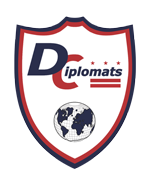
The ‘D.C. Diplomats’, a perennial participant in club competition, and former women’s champions at the U.S. Nationals
On the men’s side, there was a round-robin between four ‘Division One’ teams: the hosts D.C. Diplomats, New York City THC, Boston Team Handball and West Point Black. NYC won all their three games but had to struggle a bit before they could pull away from their Boston and West Point opponents. Both NYC and Boston feature players who grew up with handball in other parts of the world, and many of them show a good deal of finesse. The cadets, by contrast, draw more on physical strength, fitness and energy, so the match-ups between the two different styles sometimes become a bit, shall we say, intriguing.
The women’s bracket featured the same four teams, plus the ‘second-string’ West Point Gold team, a rather inexperienced team from Ocean, NJ, and then also a ‘guest’ team from UNC Chapel Hill wanting some preparation for the Nationals. Here the main battle throughout the season has been between NYC and West Point Black, but they did not get to play each other this weekend. Some of the women’s games were rather one-sided or of a comparatively modest level, but there was no lack of enthusiasm.
For me personally, the focus was on observing and helping the referees. Perhaps more than ever, we are depending on players and coaches doing ‘double duty’, as the lack of referees dedicated exclusively to that role seems more conspicuous than during any period in the past. If it is tough for the players to stay in shape and improve by having just a few weekends of serious competition every season, in addition to the intra-squad practices, then the situation is of course even more difficult for those who want to take refereeing seriously. Here the lack of match practice becomes a major obstacle for making quick progress.
So the referees I saw in action had to rely on their general handball experience, mostly as players. This means that they typically see and understand what happens on the court, and you can see from their body language that they have the right instincts. But to get from there to quick and convincing decision-making is not always so easy, as it takes quite a bit of practice to develop the right habits. Positioning and optimal work distribution also tend to depend on practice. Similarly, the routine decisions come more naturally, but the decisions in the critical moments, such as 2-minute suspensions, 7-meter throws and offensive fouls may be more erratic. But I really wish that players and coaches would appreciate more fully the sacrifice of their colleagues who pick up a whistle and help them out in this way. They deserve patience and our full support!
